(Warning: this post might contain a couple of minor spoilers for An Eye for An Eye and For Love or Money if you look too closely at the photos. If you’re playing in either scenario, just don’t peer at the maps/stat blocks below for an extended period of time.)
It’s probably because I spent so much time in academia, but I have a tendency to prepare for games with the same intensity that most people prepare for their dissertation defenses. (Actually, come to think of it, I prepare way more carefully for games than I did for my dissertation defense, but that’s a story for a different sort of blog.)
When I decided to run WFRP, the first thing I did was to go out and get a new binder. Then I decorated it, because apparently at heart, I am still in seventh grade–although I didn’t really do this stuff in seventh grade.
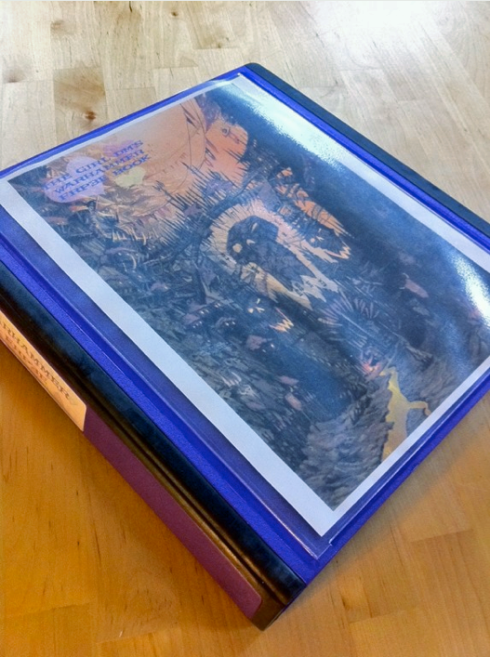
I ran a bunch of premade adventures first. Naturally, I read them over multiple times, highlighting the important bits and making notes in the margins, just so I wouldn’t miss anything. (Generally, I end up forgetting the notes in the margins, so I miss the things I thought I would miss, anyway.)
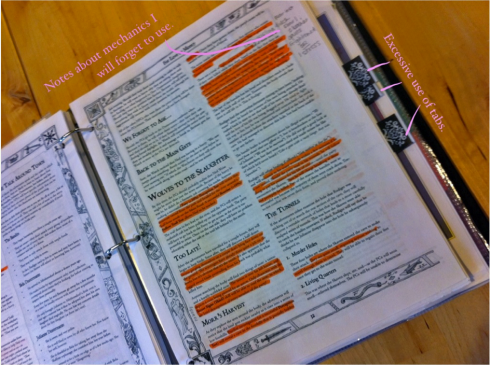
Later, I branched out and wrote some of my own material. Here are the notes I took for a bit where the party visited a sinister pig farm. Even though this was my own work, I ended up having to notate it, because apparently I don’t know myself well enough as an audience to get everything I need on the page the first time.
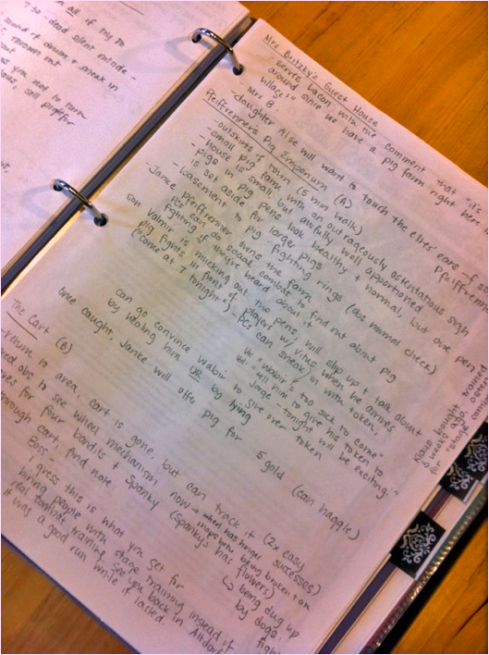
Often, I worry about wasting time by flipping through the books looking for stats, so I make nitpicky stats blocks for each adventure. Luckily, Apple’s Pages makes it easy to be obsessive and graphically appealing at the same time!
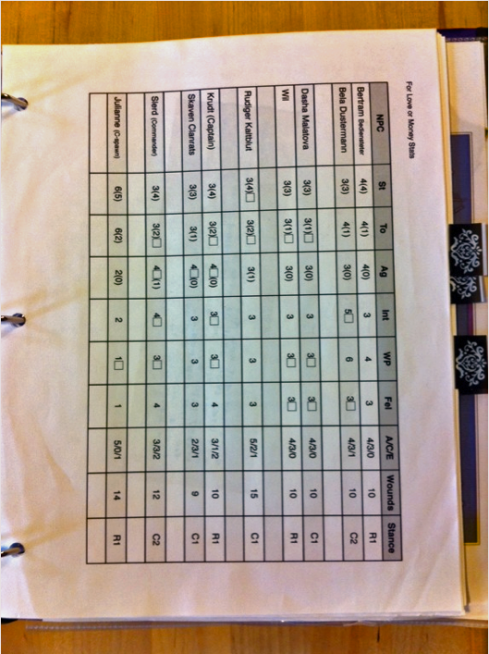
And what’s an adventure without a map? I spent some time learning Campaign Cartographer so I could have some of those, too. Here’s the pig farm:
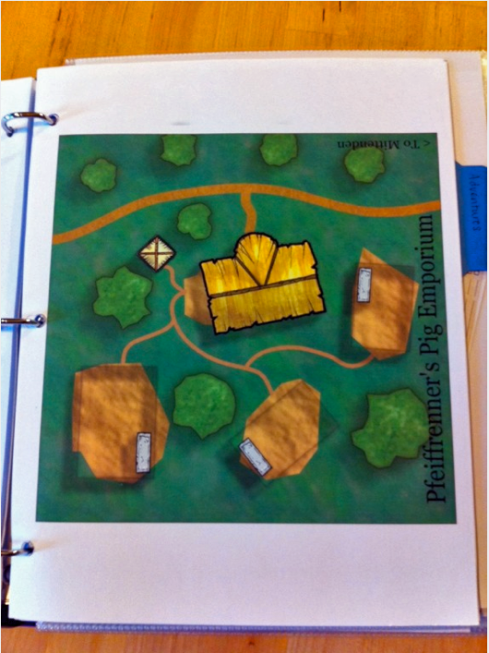
If I end up using someone else’s map, I have to add some serious notation.
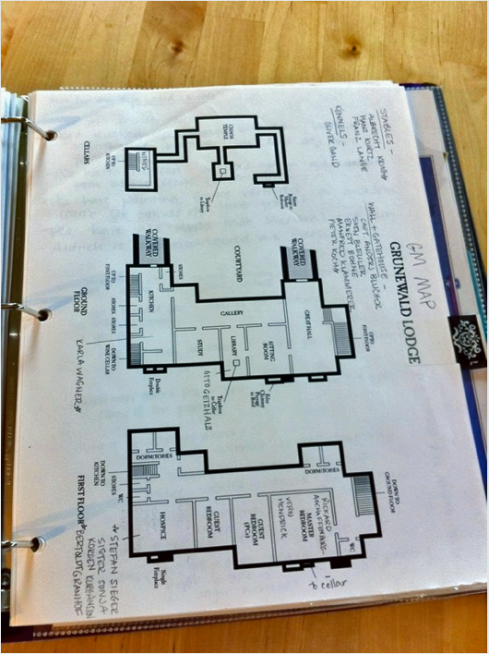
Player handouts are great for giving the GM some down time while the PCs pass the paper around the table and mutter at each other about some trivial tidbit of information you’ve delivered that now seems monumental because it’s in writing. I store those in my binder, too.
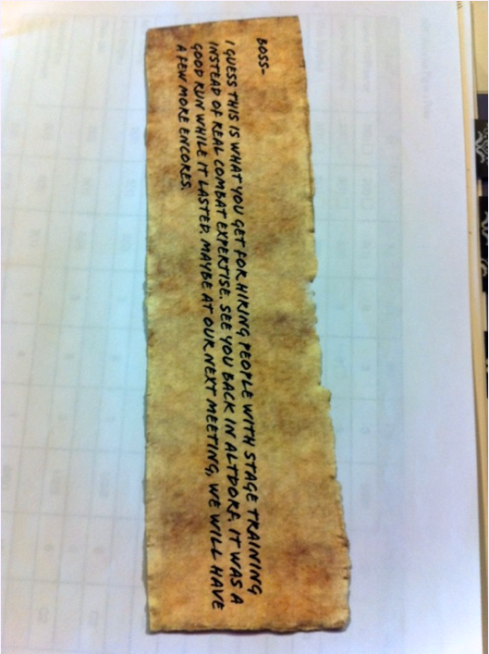
Let’s not forget the part of the binder where I catalog useful information gleaned from my favorite Warhammer sites. I could, of course, just print out the web page that contained this info, but that wouldn’t really fit the aesthetics of the rest of the binder, so I went ahead and just photoshopped the relevant information onto a Warhammery background. (As an added bonus, this let me avoid doing serious work for about an hour.)
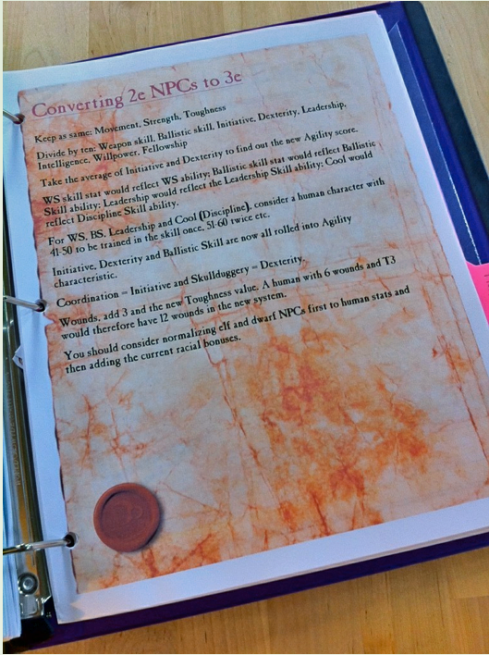
So, that’s how I prepare for games. For me, a lot of it is about getting the storyline stuck firmly in my head so I have to spend minimal time consulting anything but the basic stat blocks during the game. I’m not sure it works–I end up forgetting half of what I learned and often just give my extensive notes a miss and wing it when things come up. Still, I suppose that being so prepared tends to help the party end up in the right place, even when my ‘winging it’ has us flying way off course. Plus, I just kind of like to do it.
It looks like our group will be moving to Mouse Guard for a bit. That system is very different; all of the techniques I learned for WFRP won’t prove quite so useful. That means I’m going to have to buy another binder and start the whole process again from scratch.
Yay!
The only thing is that Mouse Guard doesn’t quite require this level of preparation, so I might not need to make quite so many handouts/maps/notes.
Boo.

3 comments
Comments feed for this article
October 1, 2011 at 11:08 pm
Jay H
Good stuff! You prepare a bit more than me 🙂
October 1, 2011 at 11:14 pm
llanwyre
I’d say you know the game much better than I do, though–so I’m sure it evens out. 🙂
October 10, 2011 at 2:53 am
Rob
Impressive preps, llanwyre.
Myself, I have outlines of what’s going to happen and a few key ideas when it’s homemade. In case of pregen adventures I’ve read through the adventure once or thrice.